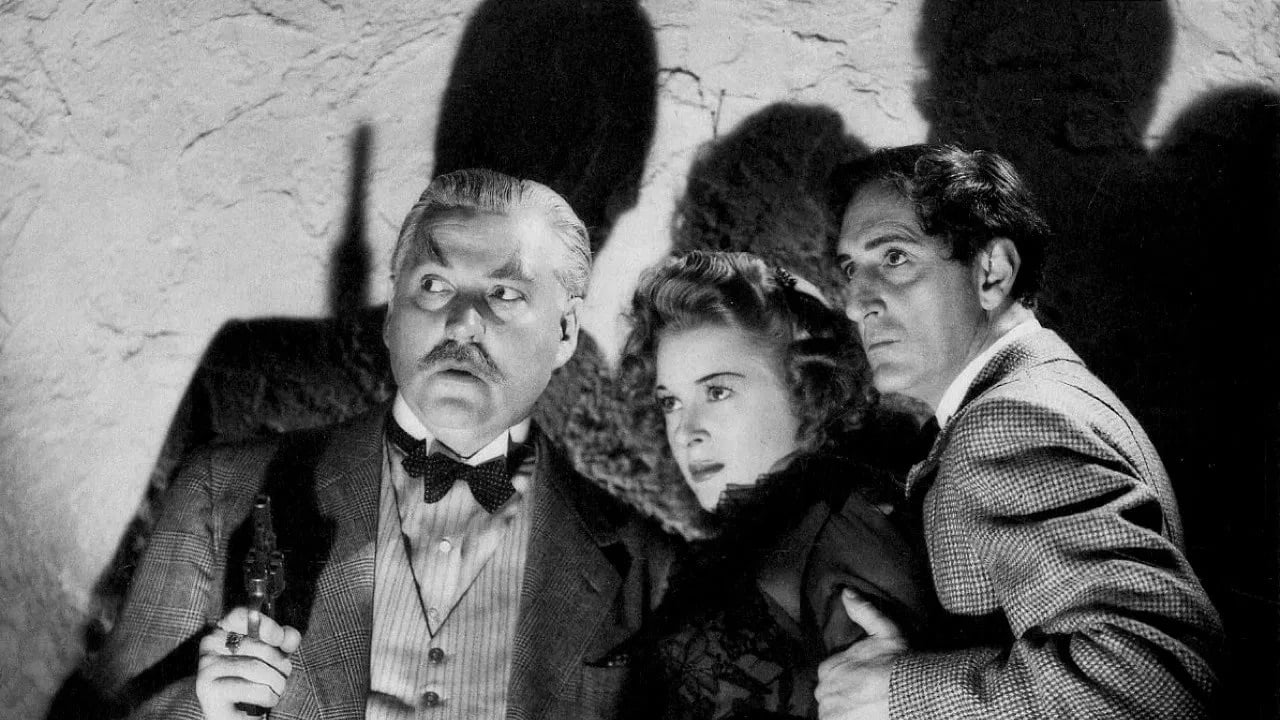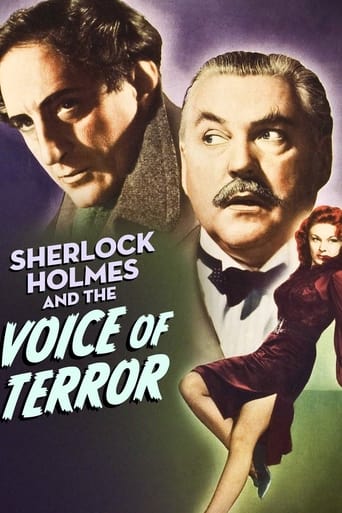

SHERLOCK HOLMES AND THE VOICE OF TERROR is the third of the Basil Rathbone series and the first to be made by Universal rather than 20th Century Fox. The Universal films were lower budgeted and had shorter running times, and they also updated the stories to the then-present day with no explanation. Thus we get Holmes and Watson tackling Nazis rather than the classic Conan Doyle villains.This story is a mixture of bits from the written story HIS LAST BOW along with a fictional version of the infamous 'Lord Haw Haw' Nazi broadcaster. It doesn't take long for Holmes to find himself on the trail of the scheming villain, and there are plenty of atmospheric touches along the way and a few exciting shoot-outs. Henry Daniell and Evelyn Ankers co-star. Given that this was made during the war, expect lots of sentimental chest-thumping and propaganda moments.
... View MoreI'm finding it hard to believe how badly the story fell apart when the reveal comes near the end of the picture. For the 'Voice of Terror' to have attained it's goals, the viewer is asked to accept that a German agent killed a British soldier TWENTY FOUR years earlier!! and assumed his identity, working his way into the British Intelligence Inner Council!! Man, I've heard of undercover operations before but this one takes the proverbial cake. It's just not very credible at all.Up till then, the story had a nicely mysterious quality as Sherlock Holmes (Basil Rathbone) is brought into the British government's inner circle by it's leader, Sir Evan Barham (Reginald Denny). We don't know it at the time, but Barham is really German Heindrich Von Boch, secretly pulling strings for the Nazis and setting up British targets for assault by the German war machine. When you think about it, Von Bach/Barham made the bonehead blunder of his life by inviting Holmes to the table to unmask the Voice of Terror. In the confrontation in which the German agent is revealed, Von Boch explains that it was his arrogant conceit that made him think he could outwit Holmes with this masquerade. I guess he never read Arthur Conan Doyle.I'd like to say more about the picture but I think it all becomes a moot exercise, almost like one of those stories that ends up being a dream sequence. One thing did strike me though relative to the movie's release date. England was already engaged in World War II at the time, so a remark Sherlock Holmes makes to his partner Watson (Nigel Bruce) was strikingly prescient - "There's an East Wind coming...". The picture ends on a patriotic note heralding a victory against the Nazis that no one could have predicted accurately at the time, not even Sherlock Holmes for all his brilliant deductive reasoning.
... View MoreAfter two features produced at Twentieth Century Fox in 1939, Sherlock Holmes and Doctor Watson moved to Universal Studios in 1942. Like the original Conan Doyle stories, the two Fox films were set in the Victorian era, but when the master sleuth and his side kick worked at Universal, the plots were moved to the then-present day, which was World War II. "Sherlock Holmes and the Voice of Terror," the first of the contemporary features, is heavy on British patriotism and anti-Nazi propaganda; the audience is even advised to "Buy War Bonds" after the end credits have faded. In a script adapted from Conan Doyle's story, "His Last Bow," classified information from the Inner Council is finding its way to the Nazis and has led to train crashes, bombings, and other sabotage in war-town Britain. The Council, against the wishes of some members, enlists the help of Holmes and Watson to track down the leak.Although often expounding patriotism and anti-Nazi warnings, Basil Rathbone always remains in character and fine form as Holmes; his iconic performance is unerring and solid. Nigel Bruce is equally fine as Doctor Watson, who ably supported his friend and provided comic relief through 14 movies. While the film's low budget is evident, the cast is full of pros and boasts some excellent character actors beyond the reliable Rathbone and Bruce; Bruce Denny, Montagu Love, and Henry Daniell among others show the talent and dedication to craft that kept them consistently employed in dozens of classic and not-so-classic movies. Elwood Bredell, the cinematographer, lensed the film with skill; the inky black shadows of Limehouse, the foggy streets of London, the crisp closeups of Rathbone and Evelyn Ankers, the female lead, elevate the film's visuals to near-A-picture status.While far from the best in the Sherlock Holmes series and a step down from the two preceding entries at Fox, "Sherlock Holmes and the Voice of Terror" has enough moments and assets to satisfy Holmes fans. The propaganda and message are heavy handed, dated, and only pad the running time; the screeching voice of terror grates on the ear; and experienced watchers of who-dunnits will easily pick out the villain. However, the acting is top notch, the photography first rate, and the fun of watching Rathbone and Bruce solve a crime is unmatched.
... View MoreSHERLOCK HOLMES AND THE VOICE OF TERROR (Universal, 1942), directed by John Rawlins, marks the return of Basil Rathbone and Nigel Bruce in their now legendary screen roles as Sherlock Holmes and his friend/associate, Doctor Watson. Having been last seen in a pair of 1939 releases ("The Hound of the Baskervilles" and "The Adventures of Sherlock Holmes") for 20th Century-Fox, this edition was an easy attempt for a new film series (1942-1946). Aside from its lead actors now performing their original roles for another studio, the Victorian characters of the 1890s have been modernized into the now contemporary locale set during the London blitz of World War II. For this rather drastic change, the opening title explains its reasoning for it: "Sherlock Holmes, the immortal character of fiction created by Sir Arthur Conan Doyle is ageless, invincible and unchanging. In solving significant problems of the present day, he remains - as ever - the supreme master of deductive reasoning." And there you have it. In true Hollywood fashion, Holmes and Watson, having moved fifty years into the future from a trip down the Time Tunnel, physically showing Holmes, Watson and their landlady, Mrs. Watson, all haven't aged a bit. The only change would be their clothing. Gone are the horse and buggy replaced by automobiles. Gone are the gas-lit street lamps replaced by electric light-bulbs. What retains here is Sherlock Holmes masterful reasoning of crime solving that never goes out of style. For this newly formatted series opening, the story, based on Conan Doyle's "His Last Bow," starts off with a view of Germany before revealing those listening to a radio broadcast from an Axis enemy mastermind known as "The Voice of Terror" predicting various acts of sabotage that are to take place in their homeland of England. Sir Ryan Barham (Reginald Denny) of the British Inner Council, calls in ace detective Sherlock Holmes (Basil Rathbone) and Doctor Watson (Nigel Bruce) of 221B Baker Street, to help stop Nazi saboteurs working in England. During his latest assignment, Holmes soon finds his life threatened, followed by Gavin (Robert Barron) stumbling into his apartment to keel over with a knife in his back. His last words before dying is "Christopher." Later, Holmes and Watson, come to Limehouse in a very rough section of town to notify, Gavin's girlfriend, Kitty (Evelyn Ankers) of what has just occurred. Holmes acquires further assistance from the young girl whose determined to fight for England and get the one responsible for Gavin's death. Because of her secret meetings with R.F. Meade (Thomas Gomez - in movie debut), it is uncertain whether Kitty is secretly working for or against this supposed Nazi, adding more suspense to the story, which is the writer's intention. Also in the supporting cast are Henry Daniell (Anthony Lloyd); Leyland Hodgeson (Captain Roland Shore); Montagu Love (General Jerome Lawford); Olaf Hytten (Admiral Fabian Prentiss) and Hillary Brooke (Jill Grandis, a female taxi cab driver). Mary Gordon as Mrs. Hudson appears with no screen credit.Placing Sherlock Holmes in contemporary times is nothing new, having been done previously in some earlier screen adaptations, notably SHERLOCK HOLMES (Fox, 1932), where Holmes (Clive Brook) and Watson (Reginald Owen) are seen in 1930s Chicago. Universal's view of modernizing Holmes was to take advantage of its dated wartime propaganda theme commonly used in countless other films in the early forties. After a few more similar war-related themes, the writers of this series eventually had it phased out in favor of either original screenplays or those adapted whole or in part from the Conan Doyle stories. Many Holmes fanciers label Rathbone's initial Universal entry to be somewhat on the weak side, making its 65 minute presentation to feel a bit longer that it actually is, but overall, it does have some good points, too. Fortunately under Roy William Neil, who was to direct all future films in the series, some even improving from its predecessor, even to a point of reviving Holmes' arch enemy of Professor Moriarty such as THE WOMAN IN GREEN (1945) as played by Henry Daniell, the same Daniell who appears in this edition of THE VOICE OF TERROR.Sherlock Holmes is ageless, and quite popular, proving so to what developed into a 16 film theatrical series that lead to Sherlock Holmes festivals quite commonly broadcast on television on any given weekend from the 1950s to 1980s, mainly those Universal editions that open with Holmes and Watson, with credits superimposed over their images as the camera follows them walking through the street of uncertainty. Distributed to home video in the 1980s and later DVD, SHERLOCK HOLMES AND THE VOICE OF TERROR's most recent cable TV offering turned up on Turner Classic Movies where this, and others in that series, premiered December 26, 2009, to commemorate the release of the latest theatrical SHERLOCK HOLMES as portrayed by Robert Downey Jr. Though the 2009 edition of Holmes retained its turn of the century outlook, it's even more contemporary through its actions. Regardless of how many actors have played Holmes and Watson on screen, the best remains for many, to be the one and only Basil Rathbone and Nigel Bruce. Next installment: SHERLOCK HOLMES AND THE SECRET WEAPON (1942) (***)
... View More